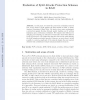Free Online Productivity Tools
i2Speak
i2Symbol
i2OCR
iTex2Img
iWeb2Print
iWeb2Shot
i2Type
iPdf2Split
iPdf2Merge
i2Bopomofo
i2Arabic
i2Style
i2Image
i2PDF
iLatex2Rtf
Sci2ools
104
click to vote
AIMS
2009
Springer
2009
Springer
Evaluation of Sybil Attacks Protection Schemes in KAD
In this paper, we assess the protection mechanisms entered into recent clients to fight against the Sybil attack in KAD, a widely deployed Distributed Hash Table. We study three main mechanisms: a protection against flooding through packet tracking, an IP address limitation and a verification of identities. We evaluate their efficiency by designing and adapting an attack for several KAD clients with different levels of protection. Our results show that the new security rules mitigate the Sybil attacks previously launched. However, we prove that it is still possible to control a small part of the network despite the new inserted defenses with a distributed eclipse attack and limited resources. Key words: P2P networks, DHT, Sybil attack, security, defense, KAD 1 Motivation and scope of work Peer-to-Peer (P2P) networks have proven their ability to host and share a large amount of resources thanks to the collaboration of many individual peers. They are known to have many advantages com...
Related Content
| Added | 23 Jul 2010 |
| Updated | 23 Jul 2010 |
| Type | Conference |
| Year | 2009 |
| Where | AIMS |
| Authors | Thibault Cholez, Isabelle Chrisment, Olivier Festor |
Comments (0)

